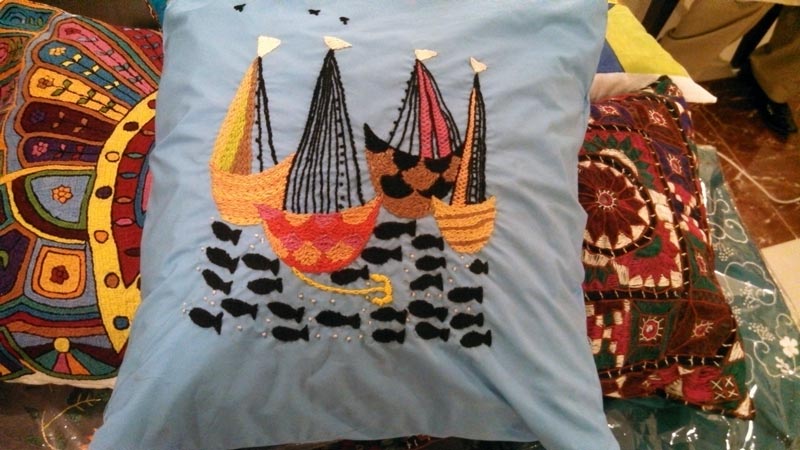Peshawar: Noreen comes from the village Pishtakhara in the outskirts of Peshawar. At the cloth market in Peshawar Sadar, she is seeking to sell her embroidery to shopkeepers who deal in embellished fabric for women’s garments. Quickly she shows the cloth she has embedded with mukesh – embroidery involving insertion of tiny silver and gold metal pieces on a dark fabric – to shopkeepers and accepts whatever money they offer for her work. There is no time for haggling because she is in a hurry to get back to her village before daylight fades.

“I have to cut deals in minutes because I can’t afford to stay away from home for long,” says Noreen 32, a long black scarf covering her head and face. Only her eyes are visible through the veil. Being a housewife and a mother of three children, she has to do the cooking, cleaning and washing at home. Once a month, she travels from her village to the cloth market in Peshawar where she sells embroidered bed sheets, shawls, children frocks, mukesh and crochet lace.
She told News Lens Pakistan,“I have to help earn for the household because my husband who is a labourer often goes without work for days when there is no opportunity.”
Noreen comes from a Pashtun family where men frown upon women working in the male-dominated market. Rural women like her not just flout convention to keep their families afloat but also keep alive the craft of designing cultural dresses for Pashtun women and children that the region is known for.
Women like Noreen, says Jamila Gillani who runs a boutique in Peshawar, are struggling as machine-made cloth and designs threaten to take away their livelihood, replacing the embroidered, handmade dresses people associate with local culture.
“Women are no more interested in home-based embroidery business as they are paid less for hours of hard work,” says Gillani, owner of the Gulkadha Boutique.

Thousands of women whose skills need to be upgraded to meet market needs, says Gillani, are becoming redundant due to lack of proper wages, limited skills and capacity and absence of equipment and training. “They have no direct access to market. This has caused the size of domestic workers to shrink.”
According to the Khyber Pakhtunkhwa Labour law, minimum monthly wages for labour should be Rs 15000. As per the Labour Law, inspection teams from the labour department should visit labourers to confirm if they are getting proper wages. They are also supposed to monitor the working conditions in smaller industries to ensure standards according to international conventions.
“Pakistan is member of the International Labor Organization that considers home-based workers as labourers with rights and privileges but our women workers are not counted under that category,” said Riaz Daavi, lawyer and the legal adviser to Shirkatgah, a women rights organization. “Women and children working in industries, offices, brick kilns, shops and providing services at homes as helpers, cookers and cleaners are deprived of their rights.”
Daavi said home-based workers do not have access to pension nor are they registered for health and death insurances. “Most families become vulnerable to poverty when they lose the sole bread-earners in the form of home-based workers.”
The Khwendo Kor has been providing skills training, marketing facilities and exhibiting workers’ products in major cities of Khyber Pakhtunkhwa, Islamabad, Lahore and Karachi. “But sustainability of domestic ventures could only be ensured if the government takes interest in domestically produced embroidery and rights of domestic workers,” said Daavi.
According to Nazra Sayed, a social activist, the cultural and traditional embroidery work would soon disappear because government is not addressing the challenges home-based workers face in Khyber Pakhtunkhwa.
“Market reach and access, training and organizing women workers under unions to ensure rights should be taken up on priority basis,” said Sayed. “Else, we would lose our rich cultural craft to the mechanised clothing industry, not to mention that a great number of men and women busy earning their livelihood from cottage industry would lose their only mode of income.”
Janat Gul, a shopkeeper in Kuchi Bazar Peshawar is of the view that they provide market to the products made by women workers. He says he pays “enough wages” to women who work for him. “These women haven’t made any investment in the work. We provide raw material for them to work with and they get wages for their labour.”
When asked if he earned more than the workers, Gul said: “I pay the shop rent and work the entire day waiting for buyers. Very few people these days are interested in cultural pieces, so I should have a share for myself.”
Noreen says she can earn up to Rs 6000 to 8000 a month but that needs all her energy, time and focus which tires her out. Her wan face and dried lips shows her exhaustion. “We have no other way to earn bread for our children. The only earning we have is from her handmade embroidery.”
For Noreen, embroidery is an inherited skill. Before her, it was her mother who embellished chadors and dresses for women and children. She says she does not having enough money to invest in proper business.
“We are forced by the market to work for small wages,” says Noreen. “The middlemen sell our products for a much higher price. Many women like me depend on the raw material provided by the middle women and men. They get a larger share of profit and pay little to workers.”



